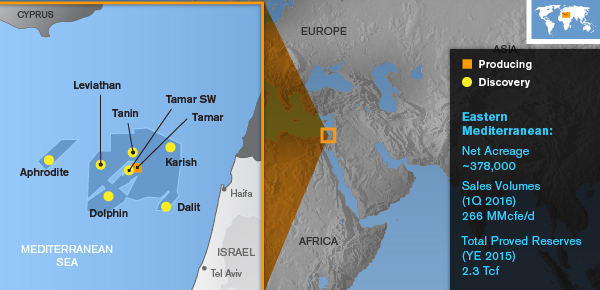Israel Approves Leviathan But Estimated Reserves Cut 20%
Israel’s energy ministry has approved the development of the giant Leviathan field but it has also published a lower estimate of the recoverable reserves.
The partners submitted their development plans for the field a few months ago, when a study they commissioned from NASI put the reserves at 21.9 trillion ft³. But the energy ministry had also commissioned an estimate, using Swiss SGS, which put the volume at 17.6 trillion ft³, a fifth less.
According to the ministry's statement, further validation drilling in areas of the 324 km² could lead to this new figure being further revised up or down. The figure matters because of the amount that may be exported is a percentage of the total.
The new development program is based on annual production of 21bn m3and the export markets are Jordan, Egypt and, in the background, Turkey.

(credit: nobleenergyinc.com)
New government in Jordan
Jordan had a new government June 2. The new prime minister, Hani Mulki, had a long career as a senior diplomat in the Jordanian foreign ministry. He served as a counsellor to the King, as foreign minister and was involved in peace negotiations between Israel and Jordan, which led to the 1994 peace treaty. According to reports in Al-Jazeera TV one of his main missions would be to promote peace talks between the Palestinian Authority and Israel.
Mulki's appointment raised hopes among Leviathan gas field partners for a rapid conclusion of a gas sale and purchase agreement with Jordan’s National Electric Power Company for a long-term contract for 3bn m³.
Turkey and Israel
Also on June 2 energy minister Yuval Steinitz told a radio show that 90% of the details of the rapprochement agreement between Israel and Turkey were agreed. "The state of the Israeli economy is problematic," Steinitz said. "After the way for the development of Leviathan was paved one of the routes for [economic] development is gas export. One of the most attractive markets in the region is Turkey. We have an enormous economic interest here."
The two sides were supposed to meet to put final touches to the reconciliation agreement last month. But political turmoil and drama in the two states – Turkey had nominated a new prime minister, while Israel was sunk in crisis during the nomination process for Avigdor Lieberman as defence minister – the talks were delayed at least until this month.
It is not clear whether Israel has accepted all the three main Turkish demands for reconciliation or whether Turkey has retracted some of its demands.
Ya'acov Zalel


